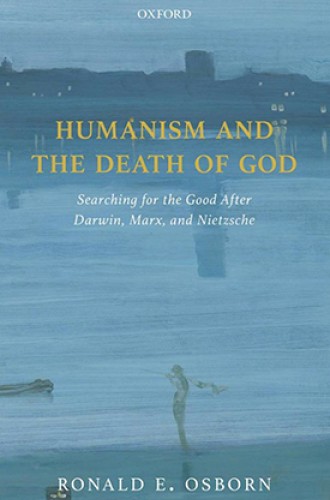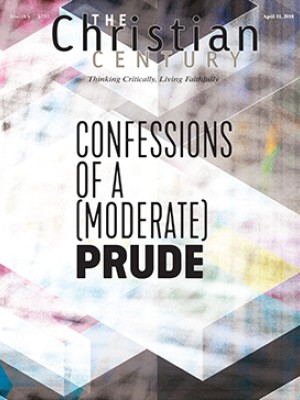Humanism with space for God
Ronald Osborn integrates a biblical perspective with humanistic values.
Philosophical naturalism assumes that everything can be explained by natural law. In its accounts of the human, God is expendable, as is all other mystery.
Not only is this view of things mistaken, says Ronald E. Osborn, it is a moral disaster. Osborn covers ground familiar to students of the Enlightenment, but he does so with such clarity, depth, candor, and feistiness as to repulse the sense of the commonplace and intensify the urgency of the message—both for the wider society and for the church itself.
As Osborn shows, the stakes are high in debates about God and the human person. Without the conviction of transcendence, can we foster and sustain commitment to the sanctity of every individual: high or low, favored or despised, rich or poor? Osborn gives good reasons for doubt. And if the debate cannot be resolved by argument alone—if no proofs decide the outcome—then must the case from the side of faith depend on “living witnesses” as its most compelling evidence? Osborn answers yes. Thus, philosophical naturalism is as much a test of Christian discipleship as it is of Christian intellect.
Read our latest issue or browse back issues.
Still, the book largely concerns arguments about these matters. Osborn begins by asking what it takes to sustain “humanistic values”—the conviction that human beings possess an “inviolable and ineradicable” dignity that entails the right to freedom and equality for all. The assumptions of “strictly materialistic science” (which undergird nihilism, the view that good and evil have no non-arbitrary substance and only reflect the wishes and influence of human minds) threaten these values. Such nihilism puts the least powerful in the most danger. Against this threat, says Osborn, the best available protection is the vision of human personhood associated with “Christian theological anthropology.”
The first iconic figure Osborn engages is Charles Darwin. He doesn’t reject Darwin outright. But, he argues, insofar as Darwinism insists that the world of the living is absolutely determined by a competition in which the strong survive and others fall away, the notion of individual human sanctity must also fall away. In a troubling way, this happened even in Darwin’s own writing, as when he spoke calmly of civilized nations “supplanting” the “barbarous” ones.
While contemporary Darwinism avoids such talk, it still envisions an evolution that is mindless and without purpose. Why, Osborn wonders, don’t the “intuitions, experiences, and traditions” that gave rise to humanistic values—themselves intimations of mind and purpose and thus part of the evidence that science must acknowledge—count for more in Darwinist deliberation? At stake is the annihilation of the self that supports the democratic institutions that humanism helped to create.
Osborn also takes on Karl Marx. Marx provided tools still “vital” for “champions of social justice” and often appealed to “human agency and freedom.” But his ardent atheism, says Osborn, skewed Marx’s moral outlook. Even though he took from the Hebrew prophets a passion to fight “human misery, poverty and degradation,” he lacked the sense that the “image of God” in humanity defines individual worth. Thus, he fell into a version of consequentialism that permitted virtually any action that would further the overthrow of capitalism. What Marx called “revolutionary terror” was fully acceptable. Osborn cites Marx’s description of some opponents’ views as “ideological nonsense about rights and other trash.” Again, the death of God puts humanistic values in jeopardy.
Osborn’s final conversation partner is Friedrich Nietzsche, the most famous champion of the “death of God.” Associating God with the Judeo-Christian “slave morality” of compassion for the weak, Nietzsche regarded the death of God as a liberation. In this view, “equal human rights or shared human dignity” neither “can nor should exist.” Scientific materialism, with its denial of purpose in nature, sets us free to embrace pagan virtues over Christian ones, praise cruelty and condemn pity, and admire the strong when they overpower the weak.
Osborn responds with his own retelling of the perspective that Nietzsche rejects, renouncing the ideology of a hierarchy that grants worthiness to some and unworthiness to others. From a biblical perspective, all people bear the image of God and therefore possess “equality, dignity and worth in themselves.” Thus, all must aspire to live their lives “in generous solidarity” with others.
In defending “theistic humanism,” Osborn aims to link the biblical vision with the sustainability of humanistic values. The final chapter of the book considers two objections to his thesis. One embraces the view that the God premise is not really necessary, the other that religious conviction, even New Testament conviction, bears responsibility for inequality and violence.
Osborn responds to the first objection by recounting the secular tendency to overlook the “religious wellsprings” of contemporary humanism, noting one skeptic who fails even to mention the Christian underpinnings of the American movement for the abolition of slavery. In the 20th century, Osborn continues, Christian social theory was prominent in the framing of the Universal Declaration of Human Rights; the founder and most of the pioneers of Amnesty International were also Christian. Osborn also presents evidence for the downside of secularized morality, such as the brutality of 20th-century atheistic political movements and Western society’s drift toward “ephemeral amusements” and relativizing individualism. Regarding faith-based inequality and violence, Osborn acknowledges the Christian tradition’s shortfalls even as he defends its substantive vision and unique contribution.
But no proofs resolve the debate between faith and philosophical naturalism. The book ends with an appeal for Christian authenticity, which seems ever more indispensable to viable Christian witness. Osborn quotes existentialist author Albert Camus, who in 1948 told Dominican monks that if Christians cannot overcome “compromise” and reclaim their capacity for clarity and “indignation,” they may live on, but Christianity itself “will die.” It is a sobering and still plausible thought. This is why Humanism and the Death of God belongs in the library of every pastor whose congregation needs a reminder of its relevance and responsibility.
A version of this article appears in the print edition under the title “Losing God, losing ourselves.”






